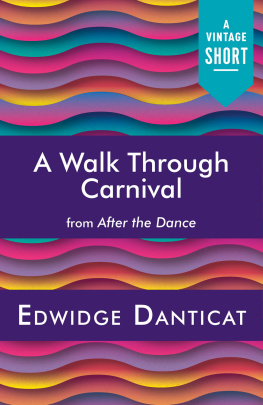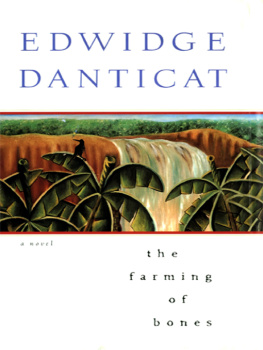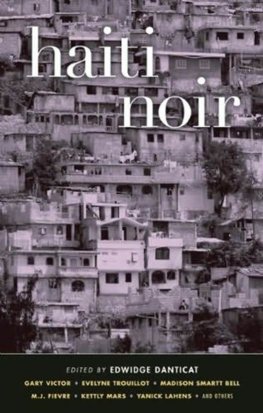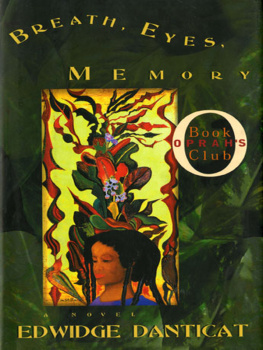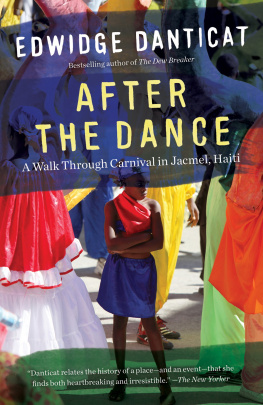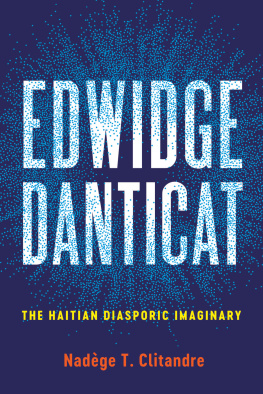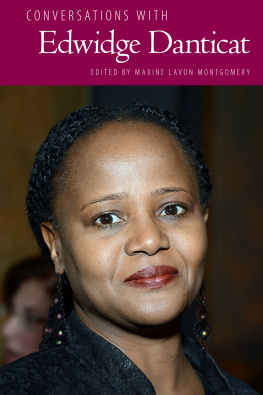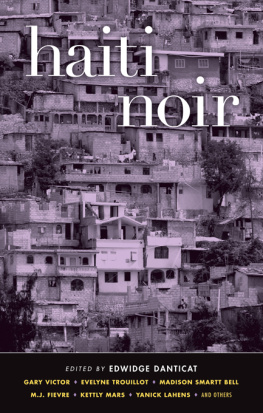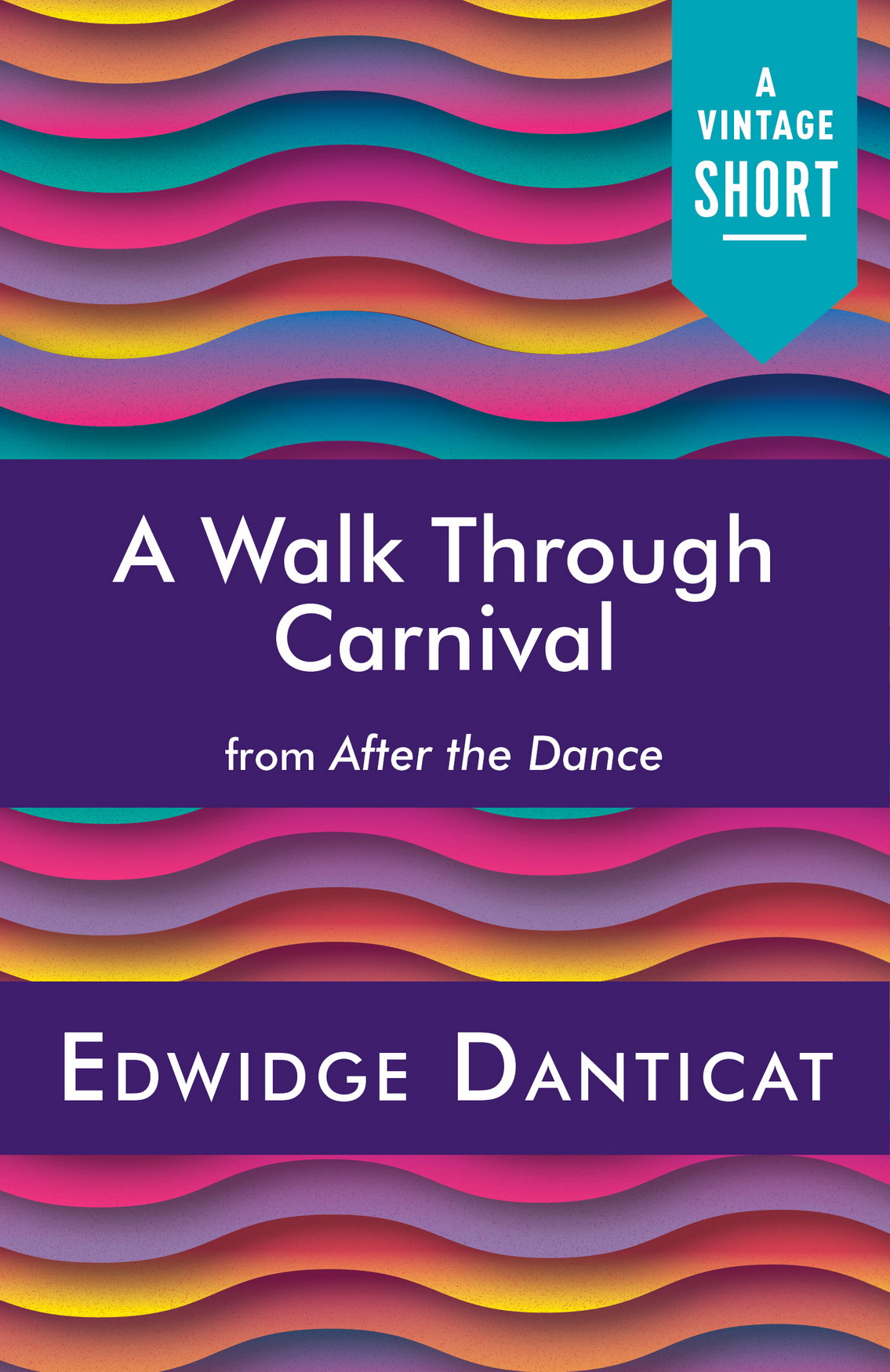Contents
Landmarks
Print Page List
Edwidge Danticat
Edwidge Danticat is the author of numerous books, including Claire of the Sea Light, a New York Times notable book; Brother, Im Dying, a National Book Critics Circle Award winner and National Book Award finalist; Breath, Eyes, Memory, an Oprah Book Club selection; Krik? Krak!, a National Book Award finalist; The Farming of Bones, an American Book Award winner; and The Dew Breaker, a PEN/Faulkner Award finalist and winner of the inaugural Story Prize. The recipient of a MacArthur Fellowship, she has been published in The New Yorker, The New York Times, and elsewhere. She lives in Miami.
A LSO BY E DWIDGE D ANTICAT
FICTION
The Dew Breaker
The Farming of Bones
Krik? Krak!
Breath, Eyes, Memory
Claire of the Sea Light
NONFICTION
Create Dangerously: The Immigrant Artist at Work
Brother, Im Dying
After the Dance: A Walk Through Carnival in Jacmel, Haiti
FOR YOUNG READERS
Anacaona, Golden Flower
Behind the Mountains
Eight Days
The Last Mapou
AS EDITOR
The Butterflys Way: Voices from the Haitian Dyaspora in the United States
The Beacon Best of 2000: Great Writing by Women and Men of All Colors and Cultures
Haiti Noir
Best American Essays 2011
A Walk Through Carnival
from After the Dance
Edwidge Danticat
A Vintage Short
Vintage Books
A Division of Penguin Random House LLC
New York
Copyright 2002 by Edwidge Danticat
All rights reserved. Published in the United States by Vintage Books, a division of Penguin Random House LLC, New York, and in Canada by Random House of Canada, a division of Penguin Random House of Canada Ltd., Toronto. Originally published in hardcover as a part of After the Dance by Crown Journeys, an imprint of Crown Publishers, the Crown Publishing Group, a division of Penguin Random House LLC, New York, in 2002.
Vintage and colophon are registered trademarks of Penguin Random House LLC.
The Cataloging-in-Publication Data for After the Dance is available from the Library of Congress.
Vintage eShort ISBN9781101972533
Cover design by Perry Delavega
www.vintagebooks.com
a_rh_4.1_141438674_c0_r1
Contents
Jacmel 2001
C ARNIVAL C OUNTRY
D URING CARNIVAL J ACMEL is not a town or a city. It is a country, Michelet Divers, Jacmels best-known carnival expert, tells me over a tall glass of lemonade on the airy terrace of the Hotel de la Place, a three-story, white Victorian-style restaurant, bar, souvenir shop, and hotel in the Bel-Air section of Jacmel. The terrace has an eye-level view of a flamboyant-filled piazza, where young men straddle the low colonnaded walls to watch the bustling human and automobile traffic stream by.
I am here for my first national carnival. Since 1992, Divers explains, Jacmel has been hosting two carnivals on consecutive weekends, the national one, which draws people from all over Haiti and the Haitian diaspora, and the local one, which is primarily attended by the residents of Jacmel.
Everyone I have spoken to about my intention to attend the national carnival festivities this coming Sunday has recommended that I first speak to Divers. A stocky forty-seven-year-old with dark, wide-rimmed glasses, Divers is a radio commentator and former school principal. He is quick to point out that he is not the one who came up with the idea of temporary sovereignty for Jacmel, but that other Jacmelians would like to see the image of the southern coastal town of forty thousand, the Riviera of Haiti, the Ibiza of the Caribbeanas the Haitian tourist guides saydetached from the one that outsiders have of the rest of the country, particularly the capital, Port-au-Prince: dirt-poor, politically troubled, and certainly lacking any celebrations.
Jacmel is not like that, says Divers, especially during carnival.
A Jacmelian by birth and choice, Divers has written a book about the Jacmel carnivals (Le Carnaval Jacmelien) and this year is the cultural adviser for both. This means that he, along with other members of the carnival committee, gets to decide which musical bands, costumed groups, individuals, and animals will be allotted a coveted spot in Sundays colorful street parade.
I do not mention it to Divers, but this is the first time that I will be an active reveler at carnival in Haiti. I am worried that such an admission would appear strange to someone for whom carnival is one of lifes passions. A Haitian writer (me)even one whod left the country twenty years before, at age twelvewho has never been to carnival in her own country? I imagine him asking. What was that about?
As a child living in Haiti with my Baptist minister uncle and his wife, while my parents settled in as new immigrants in New York City, I had never been allowed to join the carnival, as the Haitian-American rapper Wyclef Jean urged many to do in his 1997 Carnival album. I was too young (under twelve), small for my age, and we lived in one of the poorest neighborhoods in the capital, coincidentallyand in much contrast to this area of Jacmelalso called Bel-Air. Long pre-Lent days of unbridled dancing, with clammy bodies pressed either against each other or within a few inches of the giant wheels of flatbed trucks serving as floats, were considered not safe for me. However, since I had as intense a desire to join the carnival as some peculiar American children have of joining the circus, my uncle for years spun frightening tales around it to keep me away.
People always hurt themselves during carnival, he said, and it was their fault, for gyrating with so much abandon that they would dislocate their hips and shoulders and lose their voices while singing too loudly. People went deaf, he said, from the clamor of immense speakers blasting live music from the floats to the viewing stands and the surrounding neighborhoods. Not only could one be punched, stabbed, pummeled, or shot during carnival, either by random hotheads or by willful villains who were taking advantage of their anonymity in a crowd of thousands to settle old scores, but young girls could be freely fondled, squeezed like sponges by dirty old, and not so old, men. Or they could be forced to participate in a maryaj pou dis, a ten-cent or ten-minute marriage, that is, acting as if they were wed while simulating sex with a total stranger. And while we were in the realm of dangerous liaisons, there was also the possibility that a person who appeared quite normal and attractive during carnival was not a human being at all, but a demon. Besides, for the first twelve years of my life, Haiti was ruled by the dictatorship of Franois Papa Doc Duvalier and his son Jean-Claude. A military presence at public events was imperative, which made the streets that much more hazardous. At carnival, there were always militiamen and soldiers clubbing people over the head with sticks or rifle butts.
To spare me all this, my uncle would take me and the other residents of his household on a religious retreat in the mountains of Logne, the birthplace of my grandparents, where we would spend the carnival week helping relatives feed their livestock and work their land. Some of my relatives in the mountains were also known to sing raunchy songs and tell ribald jokes about wives who temporarily divorced their husbands and abandoned their young children so they could be free to fully enjoy carnival; however, it was my uncles stories that kept me away from carnival celebrations in Haiti for years.

